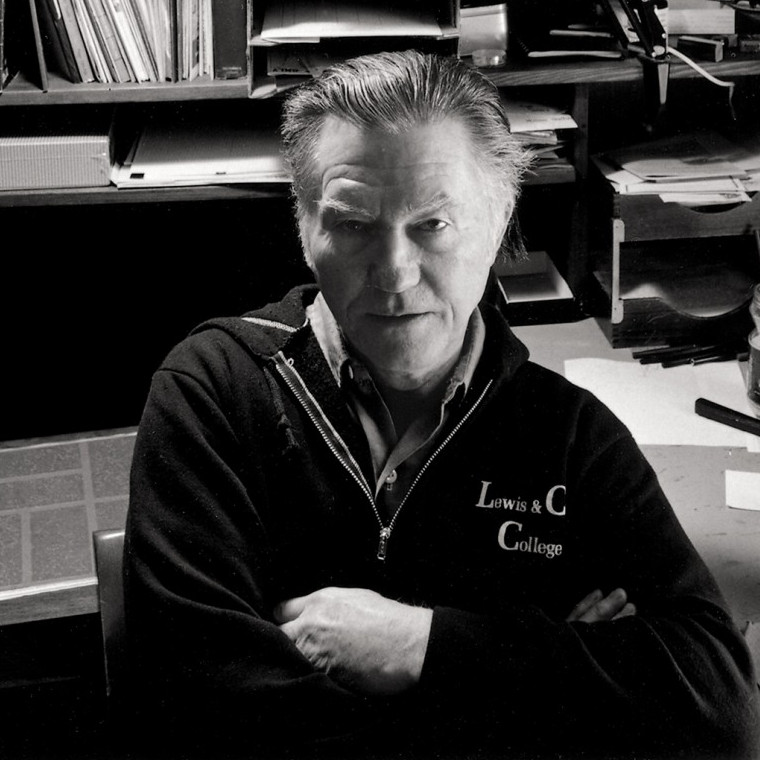William Stafford at One Hundred
Open gallery

At the centennial of William Stafford’s birth, Lewis & Clark honors a beloved professor and an esteemed 20th-century poet.
By Shelly Meyer
When I first moved to Oregon in the late 1990s, I was not familiar with the work of William Stafford. When I admitted this to my then supervisor, a highly intelligent, well-read woman, I saw her blanch. I thought to myself, I’m lucky this failing was uncovered after I was hired.
Since that time, I’ve had the pleasure of discovering Stafford’s work as a poet, as a teacher, as a pacifist—and as the patriarch of an incredibly lively family of gifted individuals. Along the way, I found the writing of his son Kim, a marvelous poet and teacher in in his own right, who works tirelessly as his father’s literary executor. I admired the creativity of his daughters, Barbara and Kit, and felt profound sadness in the loss of his oldest son, Bret. I marveled at the fortitude of his wife, Dorothy, now in her 90s, a vibrant presence who has continued to live life fully after her husband’s death. Somehow, it feels like I know them—that they are family.
Indeed, they are important members of the Lewis & Clark family. Bill’s rising reputation—winning the National Book Award in 1963 and becoming poet laureate, first of the United States and then of Oregon—contributed, in large measure, to the growing stature of the college. It’s estimated that he taught more than 2,000 students during his 30-year tenure on Palatine Hill.
Today, his legacy is still very much a part of Lewis & Clark. The college is privileged to be home to the William Stafford Archives, which contain his vast collection of private papers, publications, photographs, recordings, and teaching materials. And his work and approach to writing are still taught in the College of Arts and Sciences and the Graduate School of Education and Counseling.
Over the course of this year and next, Lewis & Clark will host a variety of activities to mark the 100th year of Stafford’s birth. If you are a confirmed Stafford-phile, you’ll want to participate. However, if Stafford’s name is less familiar to you, as it once was to me, I encourage you to get to know him through his writings and these events.
As an introduction to the college’s centennial activities, we’ve asked a few key individuals to reflect on William Stafford so that we may get to know him better. What was important to him? How did he approach the writing life? How does his legacy still enrich and inspire us? Why will we be celebrating his 100th birthday with such enthusiasm in 2014?
—Shelly Meyer, Editor
Reflections on William Stafford
-
 What was my father’s vocation when he taught English at Lewis & Clark from 1948 to 1978? And what has my vocation been, teaching here from 1979 until now? William Stafford taught literature and writing, and I’ve been teaching writing courses of all kinds, from professional writing to stories and songs. Now and then I meet someone who says, “Stafford… yes, I’ve heard of you—but I thought you would be older.” “Ah,” I say, “you mean the old man.”
What was my father’s vocation when he taught English at Lewis & Clark from 1948 to 1978? And what has my vocation been, teaching here from 1979 until now? William Stafford taught literature and writing, and I’ve been teaching writing courses of all kinds, from professional writing to stories and songs. Now and then I meet someone who says, “Stafford… yes, I’ve heard of you—but I thought you would be older.” “Ah,” I say, “you mean the old man.” -
 In our conversations and correspondence over nearly 30 years, I noticed early on that two of William Stafford’s favorite words were converge and intersect—verbs of motion indicating bodies approaching one another, and perhaps connecting. Does this sound, maybe, like the setup of some of his greatest poems?
In our conversations and correspondence over nearly 30 years, I noticed early on that two of William Stafford’s favorite words were converge and intersect—verbs of motion indicating bodies approaching one another, and perhaps connecting. Does this sound, maybe, like the setup of some of his greatest poems? -
 I met Bill Stafford in September 1967.
I met Bill Stafford in September 1967. -
 To be an ambassador for poetry in Oregon is an honor and privilege. As our state’s current poet laureate, I hold a position held by Bill Stafford for 15 years, and that makes it even more of an honor.
To be an ambassador for poetry in Oregon is an honor and privilege. As our state’s current poet laureate, I hold a position held by Bill Stafford for 15 years, and that makes it even more of an honor.
More L&C Magazine Stories
Lewis & Clark Magazine is located in McAfee on the Undergraduate Campus.
MSC: 19
email magazine@lclark.edu
voice 503-768-7970
fax 503-768-7969
The L&C Magazine staff welcomes letters and emails from readers about topics covered in the magazine. Correspondence must include your name and location and may be edited.
Lewis & Clark Magazine
Lewis & Clark
615 S. Palatine Hill Road MSC 19
Portland OR 97219

